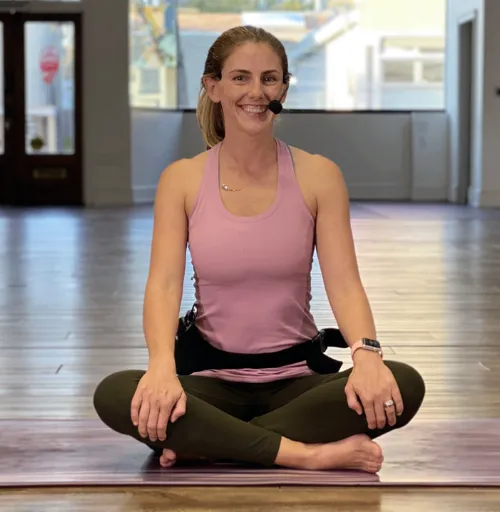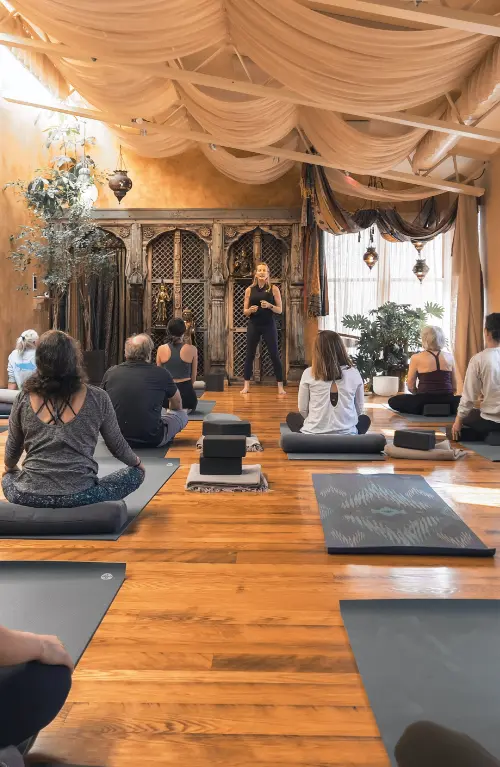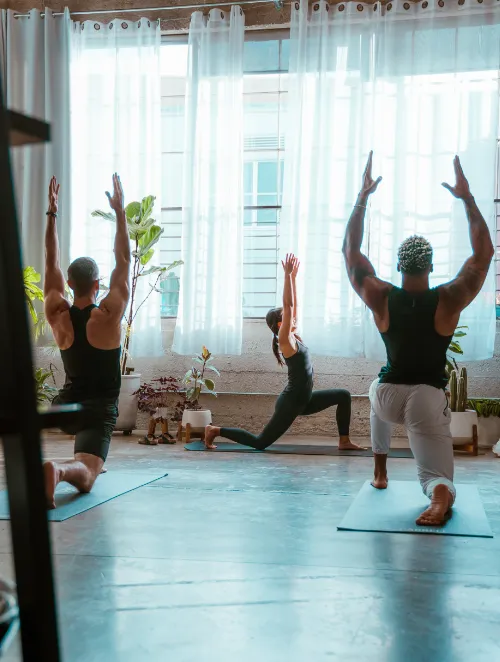
Photo by Jamie Ginsberg
Introduction
A yoga teacher is a trained and certified professional who guides students in the practice of yoga, a holistic discipline that integrates the mind, body, and spirit. Yoga teachers are well-versed in yoga philosophies, postures (asanas), breath control (pranayama), and meditation techniques. They may specialize in various styles of yoga, such as Hatha, Vinyasa, or Kundalini, each offering a unique approach to the ancient practice. They may work out of a larger yoga studio as a part of a community of teachers, or they may have their own studio at a public space or from their home.
The Importance of Choosing the Right Yoga Teacher
Choosing the right yoga teacher can significantly influence your yoga journey. A good teacher can help you deepen your practice, prevent injuries by ensuring you are using the correct form, and provide a safe and nurturing environment for your growth. Moreover, the right teacher can instill a sense of discipline, motivate you to push your boundaries, and help you explore the deeper layers of your being through mindful practice.
A yoga teacher should not just be seen as a guide but as a mentor who can help you navigate the complex world of yoga with ease and confidence. They bring a wealth of knowledge and experience to the table, helping you to understand the nuances of yoga and encouraging you to explore your potential fully.
We explore the world of yoga teachers, offering detailed reviews and insights to help you find the perfect guide for your yoga journey. Whether you are a beginner looking to start your yoga journey or an experienced practitioner aiming to deepen your practice, our comprehensive guide will assist you in making an informed decision.

Photo by David Whipple
Teaching Styles
Yoga teachers often bring a rich diversity of teaching styles to their classes, each influenced by various yoga traditions, personal philosophies, and their unique journey in the yoga practice. Some teachers may emphasize a physically demanding approach, characterized by dynamic flows and challenging postures that build strength and endurance. Others might adopt a gentler, meditative style, focusing on slow movements, deep breathing, and the nurturing of a calm and centered mind. There are also teachers who integrate a strong emphasis on spiritual teachings, weaving in philosophies and principles from ancient texts to guide students in their inner explorations.
The teaching style can be influenced by the specific yoga tradition the teacher follows; for instance, a Kundalini yoga teacher might incorporate chanting and breathwork in a distinct manner compared to a teacher grounded in the Hatha tradition. Understanding these different teaching styles can help students find a teacher who resonates with their personal goals and approach to yoga, creating a pathway for a fulfilling and enriching yoga journey.
Specializations
In the yoga community, teachers often carve out niches where they specialize, offering depth and expertise in particular areas. Below, we explore some common specializations that you might encounter:
Therapeutic Yoga
Teachers specializing in therapeutic yoga focus on using yoga practices to aid in healing and recovery. They might work with individuals recovering from injuries, dealing with chronic pain, or navigating mental health challenges, offering tailored yoga sequences to support their healing journey.
Prenatal Yoga
Prenatal yoga specialists work with expectant mothers, helping them to maintain fitness and wellbeing during pregnancy. They are trained to offer safe and nurturing yoga practices that cater to the unique needs of pregnant women.
Yoga for Children
These specialists are trained to teach yoga to children, offering classes that are fun, engaging, and adapted to the developmental needs of young learners. They might use storytelling, games, and creative visualization to introduce children to the world of yoga.
Advanced Asana Practice
Some teachers specialize in advanced asana practice, offering guidance to experienced practitioners looking to deepen their physical practice. They might offer workshops and classes focused on mastering complex postures and sequences.
Yoga Philosophy
Teachers with a specialization in yoga philosophy delve deep into the ancient texts and philosophies that underpin yoga. They offer insights into the spiritual and philosophical dimensions of yoga, guiding students in exploring the deeper layers of the practice.
By understanding the specializations of different yoga teachers, you can find a teacher who offers the expertise and focus that aligns with your personal yoga journey, whether you are seeking healing, deepening your knowledge, or exploring new dimensions of the practice.

Photo by Alen Kajtezovic
Experience and Background
When embarking on your yoga journey, the experience and background of your chosen yoga teacher play a pivotal role in shaping your path. Let’s explore why these aspects are crucial:
Depth of Knowledge
Yoga teachers with a rich background bring a depth of knowledge to their teachings. Their extensive experience allows them to offer nuanced guidance, helping you to understand the intricate details of postures, breathwork, and philosophies.
Safety and Guidance
Experienced teachers ensure safety in practice, guiding you to perform asanas correctly and avoid injuries. Their background equips them with the knowledge to offer modifications and assist students with different abilities and needs.
Personalized Approach
Teachers with a substantial background can tailor their approach to meet the individual needs of their students. They can adapt their teaching style to suit different learning preferences, creating a nurturing and inclusive environment.
Rich Anecdotal Insights
A teacher’s personal experiences and journey in the yoga world often translate into rich anecdotal insights during classes. These stories and experiences can be inspiring and offer a deeper understanding of the yoga practice.
Mentorship
A yoga teacher with a rich background can serve as a mentor, guiding you not just in your yoga practice but in your personal growth and spiritual journey as well. Their experience allows them to offer wisdom and guidance that goes beyond the yoga mat.
Connection to a Larger Community
Experienced teachers often have connections to a larger yoga community. Being under the guidance of such a teacher can provide you with opportunities to connect with a network of like-minded individuals and explore workshops, retreats, and events that can enrich your yoga journey.
Understanding the background and experience of a yoga teacher is akin to choosing a guide for an important journey. It ensures that you have a knowledgeable, safe, and nurturing hand guiding you as you explore the depths of yoga, enhancing your growth and enriching your experience on this path.
FAQs
What Should I Look for in a Yoga Teacher?
Choosing the right yoga teacher is a crucial step in your yoga journey. It can be the difference between a practice that is enriching and one that doesn’t quite hit the mark. Here are some key aspects to consider when looking for a yoga teacher:
Certification and Training
Ensure that the yoga teacher has received formal training and holds a certification from a recognized yoga institution. This ensures that they have the necessary knowledge and skills to guide you safely and effectively. Most yoga teachers are accredited from the Yoga Alliance.

Teaching Style
As we discussed earlier, yoga teachers have different teaching styles. Some might focus on physical postures, while others might integrate a lot of spiritual teachings into their classes. Consider what style resonates most with you when choosing a teacher.
Experience
A teacher’s experience can be a testament to their expertise and ability to guide students effectively. Consider looking for teachers who have a substantial amount of experience teaching yoga.
Personality
The personality of a yoga teacher can significantly influence your experience in their class. Look for a teacher whose personality resonates with you, creating a comfortable and encouraging environment for your practice.
Feedback and Reviews
Consider looking at reviews and feedback from other students. This can give you a sense of the teacher’s strengths and areas where they might be lacking.
Specializations
If you have specific needs or interests, such as prenatal yoga or therapeutic yoga, consider looking for a teacher who specializes in that area to get the most out of your practice.
Personal Connection
Finally, trust your intuition. Sometimes, a personal connection and a good vibe can be the most important factors in choosing a yoga teacher. Attend a few classes, and see if you feel a connection with the teacher.
By considering these aspects, you can find a yoga teacher who not only has the necessary expertise but also resonates with your personal style and goals, setting the stage for a fulfilling and enriching yoga journey.
How Do I Know if a Yoga Teacher is Qualified?
Determining the qualifications of a yoga teacher is a vital step in ensuring that you receive safe, knowledgeable, and effective guidance during your yoga practice. Here are some strategies and indicators to help you assess a yoga teacher’s qualifications:
Certification
As mentioned above a qualified yoga teacher should hold a certification from a recognized yoga training institution or governing body such as Yoga Alliance. This certification indicates that they have undergone formal training and met the necessary standards to teach yoga.
Continued Education
Yoga is a dynamic field with continuous developments. A qualified teacher often engages in continued education to deepen their knowledge and stay abreast of the latest trends and research in the field of yoga.
Experience
Experience is a significant indicator of a teacher’s qualifications. A teacher with several years of experience has honed their skills through practice and is likely to offer a more refined teaching approach.
Testimonials and Reviews
Looking at testimonials and reviews from other students can provide insights into a teacher’s capabilities. Positive feedback and a good reputation are indicators of a teacher’s qualifications and effectiveness.
Personal Interview or Interaction
If possible, have a personal interaction or interview with the teacher. This interaction can give you a sense of their knowledge, teaching philosophy, and approach, helping you to assess their qualifications firsthand.
Observing a Class
Attending a class as an observer can be a great way to assess a teacher’s qualifications. Pay attention to their teaching style, their ability to create a safe and inclusive environment, and their knowledge of yoga principles.
Professional Affiliations
Check if the teacher is affiliated with professional yoga organizations or bodies. Such affiliations often require teachers to adhere to specific standards, indicating a level of qualification.
Personal Practice
A qualified yoga teacher often has a deep personal practice. Their commitment to their practice reflects in their teaching, bringing authenticity and depth to their classes.
By considering these factors, you can assess the qualifications of a yoga teacher, ensuring that you choose a teacher who is well-equipped to guide you on your yoga journey with expertise and wisdom.
Teacher Reviews
We present a curated selection of yoga teachers, each bringing a unique style and approach to the practice of yoga. Our selections encompasses teachers with diverse backgrounds and specializations.
Whether you are drawn to the dynamic sequences of Vinyasa, the meditative postures of Hatha, or the spiritual depth of Kundalini, our teachers offer a rich tapestry of experiences. They’re seasoned practitioners who have walked the path, experienced transformations, and will guide you with authenticity and wisdom.
Directory
Each in-depth review gives you a holistic view of the teacher’s background, teaching style, specializations, and testimonials.
We’ve further broken the teachers down into geographic regions. It’s always best to practice in person with a teacher. There is a specialness that happens when you can be together in the same time and space.
However, it’s 2023, remote lessons are a common way of practicing with teachers. Savvy teachers have embraced this and offer remote lessons. Just because they are from a particular region, doesn’t mean you can’t study with them.
It’s possible that you study with them 90% of the time remotely and through workshops and retreats you study with them in person.
California
Truckee Yoga Teacher Lauri Glenn Massage
New York
Become a Yoga Teacher
If the world of yoga has ignited a passion in you to teach and guide others, becoming a yoga teacher could be your calling. Here are the initial steps you can take to set out on this fulfilling path:
Start with Personal Practice
Before considering teaching yoga, it is essential to have a deep personal practice. This involves understanding your body, honing your skills, and delving deep into yoga philosophies. It is through a personal journey of yoga that you can gather the necessary knowledge and experience to guide others effectively.
Teacher Training Programs
Once you have a substantial personal practice, the next step is to research accredited Yoga Teacher Training (YTT) programs. These programs are designed to equip you with the necessary training to become a certified yoga teacher. They cover a range of topics including:
- Yoga Philosophies: Understanding the ancient philosophies that underpin yoga is crucial. It gives depth to your teaching and allows you to guide students not just in postures but in a holistic yoga practice that encompasses mind, body, and spirit.
- Anatomy: A deep understanding of human anatomy helps in teaching yoga postures correctly, ensuring safety and effectiveness while preventing injuries.
- Teaching Methodologies: Learning various teaching methodologies will equip you with the skills to instruct different types of students effectively, adapting to individual needs and preferences.
Choose a Specialization
After getting to know the basics, consider choosing a specialization. Specializing in a specific area, such as prenatal yoga, therapeutic yoga, or a particular style of yoga, can give you an edge as a teacher. It allows you to offer specialized services and cater to a niche audience.
Gain Experience
Post your training, it is essential to gain hands-on experience. Start by teaching friends, family, or volunteering at local community centers. This phase is about building confidence and honing your teaching skills through practical experience.
Build a Network
As you step into the yoga teaching world, building a network with other yoga teachers and becoming part of the yoga community can be beneficial. Networking can open doors to various opportunities and help you grow in your teaching journey.
Continuous Learning
Even after becoming a teacher, the learning never stops. It is encouraged to continuously educate yourself, attend workshops and retreats, and learn from experienced teachers to evolve in your teaching journey, keeping your knowledge fresh and up-to-date.
By following these steps, you embark on a fulfilling path to becoming a yoga teacher, where you not only share the joy and benefits of yoga with others but also deepen your understanding and practice of this ancient discipline. It is a journey of personal growth, learning, and sharing, fostering a community of well-being and holistic health.
Conclusion
Embarking on your yoga journey with the right teacher is a transformative experience that goes beyond just mastering postures; it is about forging a connection that nurtures your physical, emotional, and spiritual growth. A good yoga teacher is not just an instructor but a guide, a mentor, and a partner in your journey. They bring to the table a wealth of knowledge, a nurturing environment, and a deep understanding of the yoga philosophies to help you explore your fullest potential.
Prioritize teachers who resonate with your personal goals and approach to yoga. The right teacher is your gateway to a transformative yoga experience, guiding you to not just a better practice but to fulfillment.
We hope that you find and connect with your perfect guide to foster physical, emotional and spiritual growth that you’ve always wanted.
Namaste

